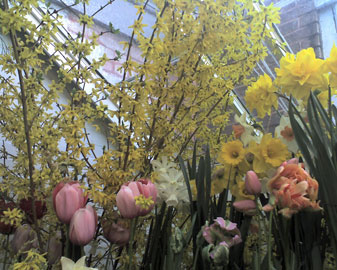How much is too much? I recently read two poetry books, Chelsey Minnis’ Bad Bad (Fence Books) and Rodney Koeneke’s Rouge State (Pavement Saw Press), that were enjoyable and frustrating for similar reasons. Both started with a clever and unique style, and both had that essential ingredient of self-mockery that keeps experimental poetry from becoming a new pretentious orthodoxy. Both books also luxuriated in excesses of language and imagery: Koeneke marrying the Orientalist fantasies of sheiks and odalisques to the trappings of suburban consumerism, Minnis describing poetry as “lickable mink” and a “doorknob covered with honey”. Yet there were places in both books where I felt fatigued, because every poem seemed to be in the same tone of voice and be funny/experimental/surreal in exactly the same way.
The cover of Bad Bad is striped Barbie-pink and white with red gothic-type letters, as if to code it “girly product, not to be taken seriously”. Of course, placing these graphics on the august cover of A Poetry Book invites us to rethink the seriousness of both girls and poetry.
Adopting the persona of a naughty little girl, the speaker of this book deflects criticism by flaunting her frivolity, yet at the same time secretly hopes to impress everyone with her cleverness. This is especially evident in Bad Bad‘s 68 “Prefaces”, my favorite section. Here’s a taste:
Preface 13
When I write a poem it’s like looking through a knothole into a velvet fuckpad…
And it is like buttery sweetbreads spilled down the front of your dress…
It is like a gun held to the head of a poodle…
If I want to write any poems I will write them!
A poem that doesn’t have any intellectual filler in it…
Like two blondes fighting on a roof…
****
Preface 20
I am a poet so I can say things…
And not so that I can have any notion of a literary lifestyle…
I don’t like to be a poet but how else can I be so fitful?
When I say “I am a poet” I expect I am saying something that is neutral of all self-congratulations…
I am saying, “I have a special quality that is like swan shit on marble…”
****
Preface 36
“Poetry writing” is a hardship
Like crying because you don’t like the wallpaper…
It is like bleeding from your anus in the snow…
But I don’t like it…
In the “Prefaces”, Minnis
tries having it both ways: she flaunts her vain and sensual motives for writing poetry, but equally flaunts her self-knowledge, as if to convince us that ironic frivolousness is not really frivolous. That coy refusal to resolve the paradox provides a great part of the pleasure of reading Bad Bad. Minnis’ surprising use of language is the other thing I most enjoyed about the book. Even when I became impatient with its limited range of themes and emotions, I kept laughing at passages that deftly spun from melodrama to true remorse to ridiculousness and back again, such as these lines from “Double Black Tulip”:
………….I write this poem like a girl in a black wig……
…………
…………………………………………………………………………
…………but my heart is the heart of a true skunk…………
…………………………………………………………….
……………………………………………..
…………..this is bad fluffy thoughts.
. . . . . . . . . . .
……………………………..like the hurtfulness of chartreuse
…………………………………………………………..carpet………
……………………….I must try not to feel a fake kindness….
Though I am a fashion junkie, I got bogged down in the 16-page poem “Foxina”, which is basically a list of sensual, outrageous, fetishistic clothing that “the women in the viewing boxes” are wearing. In my opinion, this poem shows up the limitations of a book that is composed of clever fragments. Not every poetry collection needs a traditional narrative arc, but if I’m reading from cover to cover, I like to feel some movement, some development of consciousness, such that the poems at the end of the book could only belong at the end and are informed by the journey that preceded it.
Which brings me to another question: Is a structured poetry book “better” than an unstructured one? Should I be blaming a box of chocolates for not being a three-course meal? I’ve enjoyed a number of collections where the individual poems were not dazzling, but the overall effect was powerful, because the pieces informed one another; like chapters of a novel, they might not all stand alone, but they belonged together. If Bad Bad is a box of chocolates, to be dipped into rather than consumed in one sitting, it’s like the chili-powder-and-Pop-Rocks truffles that my husband bought me for Valentine’s Day. Pacing is everything once the novelty wears off, but what a novelty it is.
The above comments would also apply to Koeneke’s Rouge State, another book whose abundance of surface variation was not always enough to compensate for the poems’ underlying sameness. Rouge State won the 2002 Transcontinental Poetry Award, and the post-9/11 date gives us a key to the poems’ political context, providing a backdrop of passion and fear that is rarely invoked directly by Koeneke’s pleasantly aimless language. The raw material of Koeneke’s poems is Western colonialist fantasies and how they might be processed by people with no cultural literacy–people whose minds are full of catchy phrases and bits of information, but without the attention span or historical awareness to put them together properly. Rouge State is like “The Waste Land” written by a likeable, confused, somewhat ADD-afflicted American teenager deployed to Iraq.
from #38
…Tonight’s ceremony will require your bride’s
virginity. Spread nard over the bedclothes
and charge it up to the hotel. The poppies mean
we’re leaving. It was a once-in-a-lifetime
sort of thing–the seeds were used for visions
and the husks served as clothes.
On the airport concourse you’ll notice a series
of fluorescent yellow cannisters: please put them down
at once. The people were so sorry when
we told them you were leaving–
that’s why I think they’re doing
that funny little dance.
Such naivete should be dangerous, but a sense of menace is mostly lacking from Rouge State, which relies perhaps too much on its readers’ knowledge of extra-textual facts to give the book its urgency. As with Bad Bad, Koeneke’s poems can be enjoyed for the reckless abundance of their vocabulary and imagery. Some of the poems could be said to have a meaning or a narrative thread, while others are more cryptic. Untitled, they are numbered from 1-50, and I couldn’t say that I discerned a reason behind the order of poems: the speaker doesn’t seem to have reached any insight by #50 that he didn’t have halfway through. In fact, quite the opposite:
#50
Summer acrostic hotshot,
Urgent as a somnambulist.
Create in me a clean heart, Zardoz–
Krazy-glue gentile moils upon me.
Orangutans, start your gonads:
Not one of you gets out of Zaire alive.
The thing I learned at scribe camp:
Hermes is vowels. Graminivores
In igloos eat more teeth.
So much for that Hummer the
Orotund senator sent round–
She got spotted on the parkway, imploring
Apaches to land.
“My, what cheesy palms you have, Sir Swithin.”
All I ever wanted was free beer.
I have come late to the appreciation of this nonlinear type of poetry, so other readers might be more patient about pushing through its difficulties. For me, an author needs a good reason to depart from recognizable modes of communication. I’m less interested in technique for its own sake. For example, in The Cow, Ariana Reines uses fragmentary and bizarre language because the passion of a speaker fighting her way back from madness to sanity bursts the bonds of ordinary rational thought.
The rationale for enigmatic speech in Rouge State might be to show that Americans have lost the ability to think clearly about the political power we wield. However, this seems like more of a conceptual point than an emotional necessity, and once made, perhaps does not need to be repeated so often. Does nonsense-humor trivialize this type of subject, whereas satire might have provided some reparative insight?
I did enjoy Rouge State, on the whole, because I read it over several weeks and could slow down to appreciate the experience of each poem, notwithstanding how familiar that experience sometimes was, underneath the inspired nuttiness of the vocabulary. And there were some brilliant passages, my favorite being this one from #39:
Ego is an autopsy
at which you’re a guest but also its theater,
a space in which no detail is too small to be applauded, but only once
the scalpels go to town.
With more such moments of profound analysis thrown in among the non sequiturs, Rouge State could have been an even more satisfying book. I have confidence in Koeneke’s imaginative powers and will be interested to see the direction of his subsequent work.






